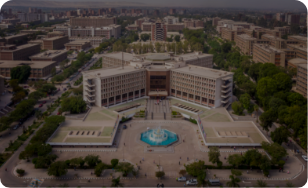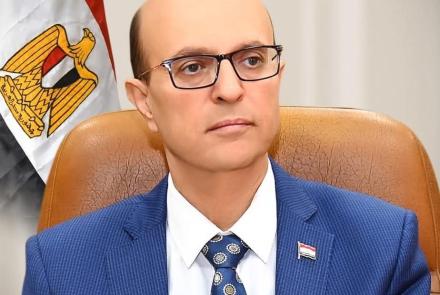Dr. El-Minshawy inaugurates the second phase of the training program for employees of Assiut University in governance and anti-corruption
- Dr. El-Minshawy: enhancing cooperation with the administrative control and the National Academy to consolidate the concepts of governance, integrity and transparency
- President of Assiut University: the training program is an important step to build the capabilities of employees and strengthen self-control
- Dr. El-Minshawy: fighting corruption is a social responsibility and an institutional culture that must be established
Dr. Ahmed El-Minshawy, president of Assiut University, inaugurated on Sunday, April 13, the second phase of the training program for university administrative staff in the field of governance and anti-corruption, in cooperation with the National Anti-Corruption Academy and the Administrative Control Authority.
The opening ceremony was attended by Major General Sherif Ramzi, head of the administrative control office in Assiut, Colonel Fouad Darwish, representative of the National Anti-Corruption Academy, under the supervision of Dr. Mohammed Adawi, advisor to the president of the University for alumni affairs, entrepreneurship and innovation and director of the Center for future studies, and professor Shawkat saber, secretary general of the University. About 75 trainees from the administrative staff are participating in the program.
The program's activities will be held from April 13 to 15, and lectures will be presented by a number of experts and academics from the National Anti-Corruption Academy, organized by Dr. Mustafa Morsi, coordinator of the National Academy at the University.
At the beginning of his speech, Dr. El-Minshawy praised the fruitful cooperation between Assiut University, the Administrative Control Authority and the National Anti-Corruption Academy, which in turn contributes to strengthening joint efforts to combat corruption and consolidate the concepts of governance, integrity and transparency, which are areas of critical impact on the present and future of our country.
The president of Assiut University stressed that the training program represents an important additional step towards strengthening these efforts, building the capabilities of employees to confront corruption, through modern tools for effective governance, and enhancing self-control in the work environment. He explained that the fight against corruption has become a social and national responsibility that goes beyond the supervisory or executive role, to become an institutional and individual culture and behavior that should deepen in all our institutions.
Dr. El-Minshawy continued, saying that the Egyptian state, led by President Abdel Fattah al-Sisi, is witnessing a major modernization process in all sectors, stressing that no development process can succeed without a decisive and real confrontation of all forms of corruption.
Dr. El-Minshawy pointed to Assiut University's keenness to support the state's vision to combat corruption, as it was one of the first Egyptian universities to apply financial inclusion and digital transformation systems in electronic payment and collection, which directly contributed to reducing the opportunities for financial manipulation and increasing the level of transparency.
He also stressed the importance of spreading awareness and a culture of integrity among all university employees, whether employees or students. The university has held training programs, organized student initiatives, and awareness-raising activities aimed at building a university environment based on values and responsibility, and enhancing the spirit of commitment to transparency and integrity.
For his part, Major General Sherif Ramzy praised the role of Assiut University for enlightenment and education, as a center for scientific, cultural and civilizational radiation in the heart of Upper Egypt, explaining the role of regulatory work, the most prominent tasks of the authority, and the crimes that the authority specializes in controlling, noting the activity of the National Anti-Corruption Academy, and the role of its experts in providing knowledge and training services to the Egyptian society.
The head of the administrative control office in Assiut also pointed to the main goal of participating in these important events, which is to work on developing the idea of combating corruption, raising awareness of issues related to preventing and combating it in all institutions, and supporting trust between community members and the Administrative Control Authority, as an important step towards removing barriers between security agencies and citizens, thanking the governance team at the University for their close cooperation with the authority in organizing these enlightened events.
For his side, Colonel Fouad Darwish expressed his happiness to participate in the activities of the training program, which at this stage provides a large amount of diverse experiences and knowledge in this field, explaining that anti-corruption training earns the trainee new patterns and methods of work, through identifying forms of corruption, tools to combat it, the efforts of the Egyptian state in strengthening the National Anti-Corruption Strategy, in addition to the impact of corruption on national security, and ethics of dealing within institutions in accordance with Egypt's vision ٢٠٣٠.
Dr. Mohamed Adawi praised the distinguished cooperation between the University led by Dr. Ahmed El-Minshawy, the Administrative Control Authority in Assiut, and the National Academy for combating corruption, which resulted in a series of distinctive events and activities organized by the University with the aim of deepening comprehensive and sustainable development policies, supporting the general orientation of the Egyptian state in its comprehensive fight against corruption, and establishing the principles of transparency and integrity.
The director of the Center for future studies added that the university organized a series of training programs for all its employees in the field of governance and anti-corruption, where (150) a student from various faculties of the university was trained, and(150) a faculty member, and today the second batch of staff training is starting, bringing the total number to (150) an intern. He also pointed out that the university students are currently preparing to launch a simulation model of the conference of the states parties to the United Nations Convention Against Corruption, in its initial version for the academic year 2025. This is a new privilege of the University in this field.
Dr. Mostafa Morsi pointed to the impact of the fight against corruption on all members of society, and its role in guiding the individual towards defending rights and assuming responsibilities and duties. He added that from this point of view, the university was keen to implement the objectives of the National Anti-Corruption Strategy 2023/ 2030 including the training of university members of the faculty, staff and students to address this phenomenon in all its forms.
It is worth mentioning that the training program includes a number of important lectures in the field of anti-corruption, where the first day deals with topics about the Administrative Control Authority and the Egyptian state's information infrastructure project, and the second day deals with lectures on the vision of Egypt 2030, corruption and national security, and the third day discusses governance in the face of corruption, management and business ethics.
 Do you have any questions?
Do you have any questions? 





